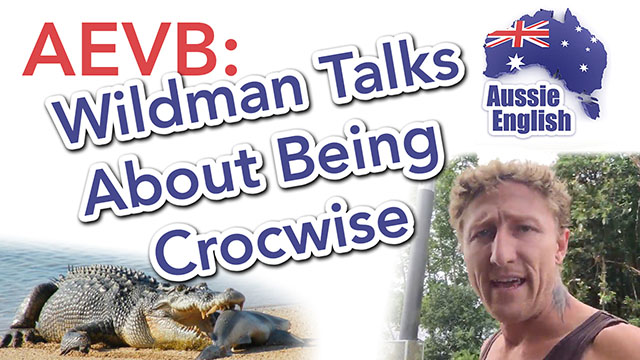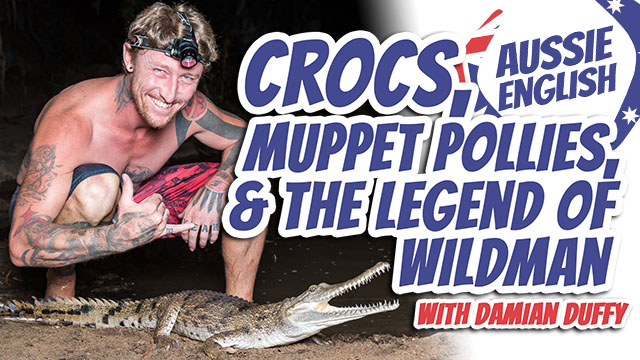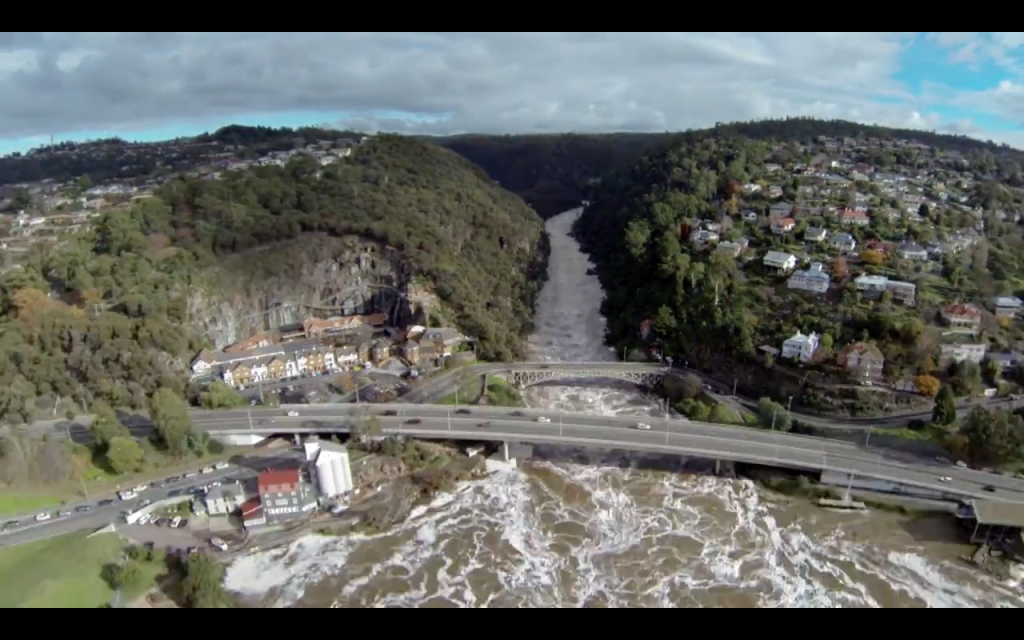AE 276.2 – AEVB: Wildman Episode Vocab Breakdown
Learn Australian English in this Aussie English Video Breakdown episode where I breakdown the vocab used by Wildman as he’s talking about being crocwise.
AE 276.2 – AEVB: Wildman Episode Vocab Breakdown
G’day guys. Welcome to this episode of Aussie English Video breakdowns.
Today I’m going to be breaking down a video by a guy named Wildman.
So, he’s from Queensland, and he does a lot of stuff out and about in nature, checking out the animals, the wildlife.
He uploads a great deal of different videos and different information about Australian wildlife online.
So, definitely make sure you go to his Facebook page and give him the like.
Say g’day from Pete and Aussie English. It’s Wildman Adventures, and it’ll be attached below in a link.
So, today I want to break down this video, and he says a lot of really interesting stuff.
He has a very broad Australian accent. So it’s going to be good practice for you guys.
Let’s get into it.
Yeah, g’day folks Wildman here.
Down at the boat ramp on the edge of the Daintree River, and I’ve come across something that annoys me quite a lot.
We’ve got down here a heap of fish scraps, alright?
Some fishermen’s come along and decided he’d dump his baitfish here.
We’ve also got, and I’m not going to go too close to the water, there’s a heap of fish scraps all dumped in the water.
About 30 or 40 fish in there. And what happens now is crocodile comes along.
They come up onto the boat ramp to eat these fish.
Someone reports it, poor crocodile gets removed, and quite often killed.
This sort of behaviour that needs to be taken responsibility for.
If you’re going to have people leaving their fish scraps they need to be fined and punished for it so it sends a message out that this behaviour is not to happen.
Crocodiles are getting persecuted for people’s stupid behaviour, and this is not a prime example of it.
This is what we’re talking about people. You do silly things in croc country bad things can happen.
If you be smart and they crocwise you have no dramas.
If you’re a fisherman don’t leave your bloody fish scraps on the boat ramp.
You’re a dickhead.
We’ll just go in and break it down sentence by sentence.
“Yeah, g’day folks. Wildman here.”
“Yeah, g’day a Folks Wildman here.” So, he’s just saying, “G’day guys. G’day people.”.
“Folks” is another way an Australian English, and English everywhere, that you can refer to people.
“G’day folks”. “How’s it going folks?”. “What are these folks doing?”. “Folks.
“Wild man here”, just means, “It is Wildman here. This is who I am. I’m Wildman, and I am here.
“(I’m) down at the boat ramp on the edge of the Daintree River.”
“I’m down at the boat ramp on the edge of the Daintree River.”
So, “a boat ramp” is a ramp that we used to put boats into the water.
And the Daintree River is a very large river that’s found in the Daintree Rainforest at the top of Queensland.
So this is right up in the north of Australia.
“And I’ve come across something that annoys me quite a lot.”
So, he’s come across something that annoys him quite a lot.
“To come across” means to find, to stumble upon, to discover.
And “to annoy” obviously means to irritate.
“We’ve got down here a head of fish scraps. All right?”
“We’ve got down here a heap of fish scraps. All right?”.
This means he’s found down here, as in on the ground, down below.
He’s found a lot of fish scraps.
“Scraps” is a way of saying leftovers, pieces, bits of fish.
And so, this is obviously what fishermen have left on the ground.
And he says “all right” as a way of saying to you, “Do you see this? Do you agree? All right? Do you get it?”
“Some fishermen’s come along, and decided he’d dump his bait fish here.”
“Some fisherman’s come along and decided he’ll dump his fish scraps here.”
So, “to come along” means to arrive, to come to a place. Someone’s come along.
They’ve arrived here. And “to dump” means to deposit or dispose of.
So, they’ve just thrown their fish scraps away and left them on the ground.
“We’ve also got, and I’m not going to go too close to the water,…”
“We’ve also got, and I’m not going to go too close to the water,…”.
“We’ve also got”, we also have.
He doesn’t want to go too close to the water, because there’re crocodiles in this area, saltwater crocs, man-eating crocs, crocodiles that can kill you.
And so, it’s always wise, especially in the north of Australia, to stay away from the water’s edge.
“There’s a heap of fish scraps all dumped near the water. About 30 or 40 fish in there.“
“There’s a heap of fish scraps all dumped in the water. About 30 or 40 fish scraps dumped in there.”
So, he’s just pointing at the water and they’re floating around in the water.
Someone’s also dumped them right at the water’s edge.
“And what happens now is crocodile comes along.”
“And what happens now is a crocodile comes along.”
And what happens now, because someone’s left these fish scraps in the water, a crocodile will come and eat them.
They’ll arrive. They’ll come to this place. They’ll come along.
“They come up onto the boat ramp to eat these fish.”
“They come up on to the boat ramp to eat these fish.”
So, they’ll come up onto the boat ramp, and they’ll try and eat these fish scraps that someone’s dumped on the ramp.
“Someone reports it, poor crocodile gets removed, and quite often killed.
“Someone reports it, the poor crocodile gets removed, and quite often killed.”.
So, if someone “reports it”, it means they’ll see it and they’ll tell the authorities, they’ll report it to the authorities so that the authorities will come in and get rid of this crocodile.
We have a lot of crocodile issues in Australia where they get too close to people, too close to humans, and quite often it’s because humans do something dumb and it’s not the crocodiles fault.
So, if they get removed, it means they will be captured and taken away. They’ll be released somewhere further from humans.
But unfortunately too they’ll often also be killed or euthanised, put down, by the authorities.
“This is the sort of behaviour that needs to be… taken responsibility for.”
“This is the sort of behaviour that needs to be taken responsibility for.”
This is the sort of behaviour that people need to take responsibility for.
They need to avoid doing this in the future. It’s not okay. It’s not correct.
“If you’re going to have people leaving their fish scraps they need to be fined and punished for it.”
“If you’re going to have people leaving their fish scraps they need to be fined and punished for it.”
So, “to be fined” is to be charged a certain amount of money as a result of something you’ve done wrong.
So, forced to pay something, a certain amount of money to an authority.
And “punished” is obviously to have some kind of penalty inflicted upon you.
“So, it sends a message out that this behaviour is not to happen.”
[00:06:30] “So, it sends a message out that this behaviour is not to happen.”
It sends a message out in that it gets a message across, it sends a message to people everywhere else, so, it goes out to other people, that this behaviour is not to happen.
That it is not okay for people to do this. That it shouldn’t happen. That you shouldn’t do it.
“Crocodiles are getting persecuted for people’s stupid behaviour.”
“Crocodiles are getting persecuted for people’s stupid behaviour.”
“To be persecuted” is to be treated poorly because of something that you are.
“And this is another prime example of it.”
“And this is another prime example of it.”
That’s just another way of saying this is a perfect example, a great example.
This is a prime example.
“This is what we’re talking about people.”
“This is what we’re talking about people. So, this is the kind of thing we need to discuss, that we’re talking about.
“(If) You do silly things in croc country bad things can happen.”
“If you do silly things in croc country bad things can happen.” “Croc country” is just anywhere in the world, but in Australia here, where you will find crocodiles.
So it’s the part of the country where there are crocodiles, croc country.
“If you be smart and be crocwise, you have no dramas.”
“If you be smart and you be crokwise you have no dramas.”
If you’re “crocwise” it means that you are intelligent, you are wise around crocodiles and thus don’t dump fish scraps near the edge of the water.
You don’t go near the edge of the water.
You give respect to the crocodiles, and you’re smart around them so as to not get in danger yourself.
“To have no dramas” is a really Australian way of saying, “You’ll have no problems”, “you’ll have no issues”.
“You going to have no dramas mate. You’ll have no worries at all.
“If you’re a fisherman don’t leave your bloody fish scraps on the boat ramp. You’re a dickhead.”
“If you’re a fisherman don’t leave your bloody fish scraps on the boat ramp. You’re a dickhead.”
So, “bloody”, here, is just a way of emphasising it. It’s slightly rude, but not really.
It’s just adding emphasis. It’s not near the F word. If I was to say fucking, which is incredibly rude.
It’s used in exactly the same way, but it’s a lot more polite, and you can do this on TV, on podcasts, etc. without people complaining too much. “Bloody”.
If you call someone a “dickhead”…
This used to be a lot ruder than I feel it is today, but today it just means an idiot. An idiot.
“You’re a dickhead mate”. “You’re an idiot”.
Yeah, g’day folks Wildman here.
Down at the boat ramp on the edge of the Daintree River, and I’ve come across something that annoys me quite a lot.
We’ve got down here a heap of fish scraps, alright?
Some fishermen’s come along and decided he’d dump his baitfish here.
We’ve also got, and I’m not going to go too close to the water, there’s a heap of fish scraps all dumped in the water.
About 30 or 40 fish in there. And what happens now is crocodile comes along.
They come up onto the boat ramp to eat these fish. Someone reports it, poor crocodile gets removed, and quite often killed.
This sort of behaviour that needs to be taken responsibility for.
If you’re going to have people leaving their fish scraps they need to be fined and punished for it so it sends a message out that this behaviour is not to happen.
Crocodiles are getting persecuted for people’s stupid behaviour, and this is not a prime example of it.
This is what we’re talking about people. You do silly things in croc country bad things can happen.
If you be smart and they crocwise you have no dramas.
If you’re a fisherman don’t leave your bloody fish scraps on the boat ramp.
You’re a dickhead.
Check out Wildman’s Facebook page here! Give him a like and say g’day from Pete!
Check out more Aussie English Video Breakdowns!
Here's what you get when you sign up!
- Read while you listen using the Premium Podcast player.
- Understand every word in every episode.
- Download all PDF transcripts and MP3s for 600+ episodes.
- Get access to bonus member-only episodes.












Responses